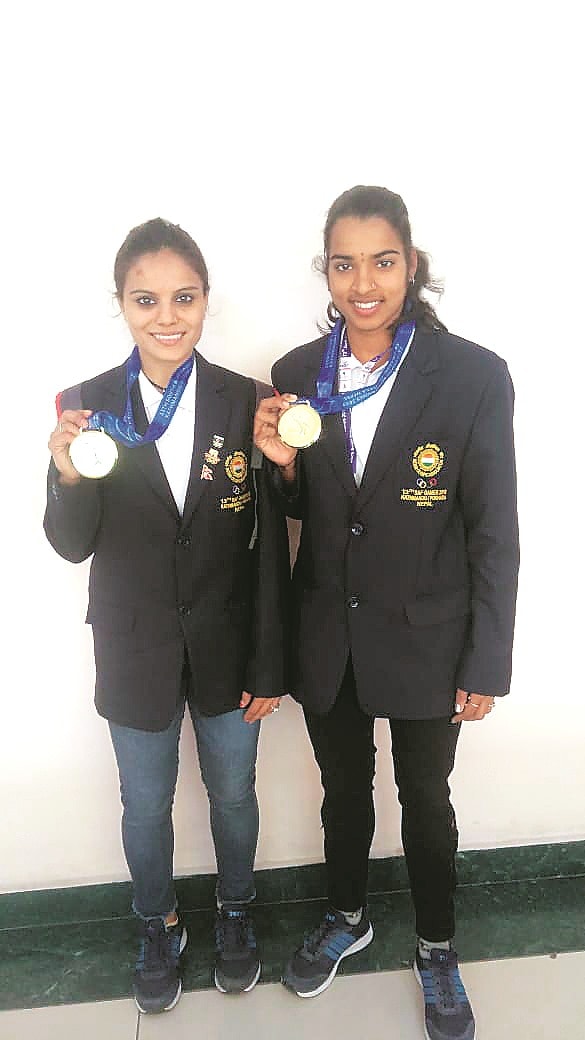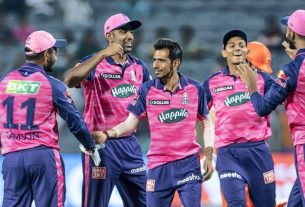Mohammad Gafoor, Nasreen’s father, flaunts a scarf her daughter brought from Nepal. Despite financial woes, he fully supported her. (Express Photo: Premnath Pandey)
Thank you for reading this post, don't forget to subscribe!India’s South Asian Games (SAG) gold-winning kho-kho captain Nasreen says she learnt the art of eluding chasers while rising to challenges life threw at her.
Playing on hard mud surfaces, Nasreen’s early coach would ask her to train with boys’ teams, a daunting prospect given they were stronger and faster, and she was often left bruised. “’Taang pakadke giraa do usko’ (pull her down by the leg) would be the standard instruction. I got so good at running fast and diving out of their grasp, I became fearless against tough chasing packs,” she recalls.
India’s ace diver in kho-kho, who is said to escape chasers like a pashmina slides through a ring, got even better at diving when she moved from mud to the cushioned mat.
A bigger leap had been taken by the family from Shakurpur in Delhi earlier. Her father Mohammad Gafoor sells steel utensils on the streets on most days. He is at the Monday market in Jahangir Puri near Machi market, selling thick, bright winter clothing material, proudly donning the scarf Nasreen brought from Nepal’s South Asian Games.

Nasreen (left) with South Asian Games medal
On some days, he earns a maximum margin of Rs 30 in the weekly markets, lugging his wares – bunches of stainless steel spoons and a pack of dozen water drinking glasses.
As soon as it became clear at school that Nasreen was exceptionally speedy on the kho-kho ground (she also participated in athletics and kabaddi), Gafoor knew he had to isolate her from ordinary woes that befall street sellers – from cops and municipality officials chasing away hawkers to unsteady income on lean days. “Khaane ki dikkat, police ke dande, karza, udhaari, thelaa uthaake le jaaneka dar, yeh sab dimaag ke tension se door karna tha usko,” he explains.
Nasreen recalls her father telling her that only her opponents were her enemies for the duration of the match. “Agar India khelegi to desh humaare liye sochega” (if you play for India, the country will think about us), Gafoor reckoned when the 21-year-old debuted a few years ago.
The father would also put his foot down against societal pressures holding her back. “We are Muslims. From childhood, we have been treated badly by all people, and nobody came to our help. When someone talked about purdah, I discussed with my wife and decided that we’ll not listen to anyone,” he says. His daughter’s dedication and stubbornness were infectious, he adds.
“Relatives had a problem with everything,” Nasreen recalls. “’Girls shouldn’t play, they can’t wear shorts, how did you let her go out for the Asian Championships for a week? How did you allow her to be at the national camp for a month in far-off Gujarat?’ My parents never got demotivated. They said ‘let people keep talking, we trust you’.”
Nasreen was fourth among seven sisters and four brothers. Gafoor had come to Delhi from Araria district in Bihar, after being orphaned by age 14, and robbed of his ancestral property by relations. After Nasreen won gold at SAG, Gafoor says with pride: “Pehle woh Gafoor ki chhori thi. Ab main Nasreen ka papa karke jaana jaata hoon. (Earlier, she was Gafoor’s daughter. Now I’m known as Nasreen’s father.)”
In Nepal, Nasreen’s team came up against a home team coached by Indians Munni Joon and Sheetal Chauhan. “They surprised us by showing our skills. We’ll have to up our game,” Nasreen says ahead of the inaugural franchise-based kho-kho league in February.
Now she brings home a monthly salary of Rs 26,000 from her Airport Authority of India job. Night markets meant renting out tables, lights and corners. “2000 in, 500 Rs out,” Gafoor laughs.
Having played age-group nationals and seniors simultaneously and shining at all levels, Nasreen started enjoying basic luxuries – like national holidays. “Earlier holidays meant markets closed for my father, and chances of no food on that day. As an athlete, I was always hungry, so we would dread holidays. Now I celebrate holidays like others,” she says.
Kho-kho also fulfilled a dream she hadn’t dared to dream as a municipal school girl in Class 3. “Properly London hoke aaye!” England plays kho-kho at the university level, so we went for an international series. I sat in a plane for the first time. My father laminated the entire newspaper page though my news was just two bars,” Nasreen laughs.
The father-daughter duo also gathered courage to travel to Bihar and meet local officials to reclaim their snatched property earlier this year. Gafoor says Nasreen is India’s gold-winning captain and speaks confidently “like an officer.” As India captain, she likes forging team bonds and camaraderie, and solving language problems of players from across the country as she is quick to grasp different tongues.
Nothing significant was achieved on the last visit to their native village, but Gafoor insists he was proud of how fearlessly his daughter put forward her point in front of highly-educated officials. “I’ve trained with men trying to drag me down by my feet in my sport. I can dive out of everyone’s reach. I’m also confident of talking to anyone,” says the second-year student.




